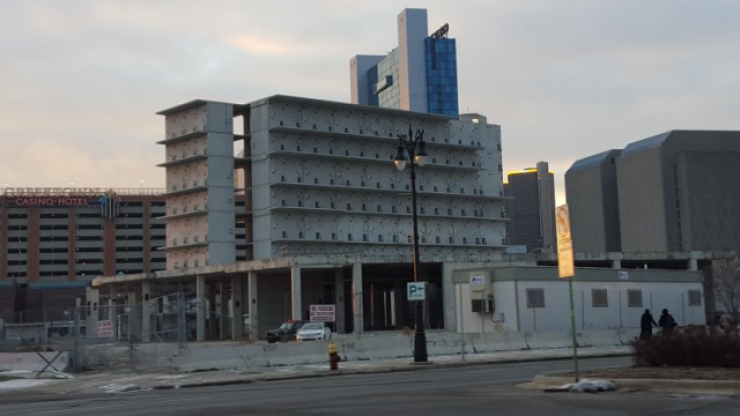DALLAS -- The Detroit City Council approved a land swap with Wayne County that paves the way for plans to build a new criminal justice center instead of completing a partially built bond-financed jail in downtown Detroit.
The deal was passed in a unanimous vote on Tuesday.
The deal must now gain approval of the Wayne County Commission and the Wayne County Land Bank Board.
It’s also contingent on the county reaching an agreement with Dan Gilbert's Rock Ventures to develop the new site. That plan still hinges on an Internal Revenue Service decision on whether the county can use jail bond proceeds from the original borrowing to build on the alternative site is still pending.
It is unclear how Rock Ventures plans to develop the Gratiot location after it announced earlier this month that it no longer intends to build a professional soccer stadium at the site.

Rock Ventures had previously planned a stadium there in a bid to land a Major League Soccer franchise. However earlier this month the ownership group led by Tom Gores and Dan Gilbert said the NFL Detroit Lions' owners, the Ford family, joined the bid, which now calls for the MLS team to play at the Lions' 65,000-seat Ford Field.
Under the agreement that advanced Friday, Wayne County would take ownership of a portion of a Detroit Department of Transportation property where the new jail would be built under the proposal being pursued by Rock Ventures.
In return, the city would receive ownership of the 1.4 million-square-foot former American Motors Corp. site on Detroit's west side, which is currently owned by the county land bank.
Rock Ventures would build the county a new criminal justice center with a 2,280 bed jail, criminal courthouse, prosecutor offices, sheriff administrative offices and a juvenile detention facility at an approximate cost of $520.3 million.
The county would be responsible for $380 million plus the cost of acquiring the land and Rock would cover any cost overruns. The $380 million would be funded through a combination of unused proceeds from a $200 million direct-pay, taxable recovery zone economic development bonds sold in 2010 by the Wayne County Building Authority and the issuance of about $200 million of new bonds, according to Evans.
The IRS in July 2015 began conducting a targeted audit of the Wayne County Building Authority's 2010 bonds due to concerns about possible tax code violations, according to a disclosure notice the county filed. Jail construction began in 2011 but was halted in 2013 due to rising costs.
The IRS notified the county about six months ago that the audit was resolved without any adverse action and no penalties would be imposed as long as about $50 million of remaining proceeds were used to complete the project on the current site.
Opting to move the site would expose the authority to losing the federal subsidy payments the county receives for the taxable bonds that were issued under the recovery zone economic development bond program. At risk is a total of about $170 million in subsidies, which includes more than $50 million the county has received so far.





